#russian apt.
Explore tagged Tumblr posts
Note
How does Clint end up meeting the Russian murder fam?
Heyo! Another controversial take incoming! Apologies!
I have a real big gripe with how the whole Natasha has another family was handled in the Black Widow movie. I generally dislike how the movie handled her character, set up legacy characters like Yelena, and its treatment of the Red Room and its imminent threat.
I appreciate what it was trying to do but I think on the whole for me personally it fell flat on its face.
(Which is why I started writing Sightline in the first place! So, I guess I mist give it props for inciting enough of an emotional reaction to start writing.)
Cannon wise Clint only meets Yelena.
Non-canon I can make up my own shit wise, said Russian murder family does not exist with the notable exception of Yelena. However my treatment of her is far closer to her comic origin and motivation than what was portrayed in the movie.
With that said, after the dust has settled, allegiances changed and hearts mended I think Yelena and Clint would get on fairly well. Clint’s got that whole lost puppy savior complex going on that I enjoy playing with and I think Yelena would love to met the man that helped her sister out so much. She definitely finds his dad jokes obnoxious and oh so American, but she warms up to him eventually.
Anyway thank you for asking, I apologize that the Black Widow movie is a bit of a sore spot for me. I definitely consider myself the black sheep of the fandom in this regard. I don’t actively bash it, I just think it could’ve been executed much much better. But hey that’s just my opinion, as my friend always said writers have two things opinions and plot holes!
#ask me#clint barton#hawkeye#clintasha#natasha romanoff#black widow#marvel#fandom#the black widow movie#Russian murder family is hilariously an apt description
7 notes
·
View notes
Text
#🫶#rn im only fluent in english but ive been studying and on-off learning languages since i was in like late elem school#theres so much i want to read and understand fully for all 3....#i got pretty good at basics of russian before i moved into this apt a year and a half ago and ive spent the most time w that one of the 3#i eventually want to learn all of them but idk which to start with bc theyd all be so valuable to me and i dont want to learn multiple simu#the thing is. i am so bad at speaking english pronunciation wise and i have a lil lisp -_- graaaaaaugh#theres a lot i want to read in polish and russian and listen to/watch but i think id talk more in actual hebrew and use it socially#do you guys understand my dilemma#eventually id like to learn yiddish and biblical hebrew as well but those are Not Options rn
0 notes
Text
uhhhhhhhhh there may be a rent stabilized 2 bed opening in my building bro??!!
#we'd never need to move LMAO.... we could just stay here forever lmaoooo#and then only invest in mutual funds/stocks/etc instead of relying on property value for net worth#AND we're in a really good school district if we ever choose to have kids#like the second they move i'm gonna be sooooo fucking unhinged at my landlord cuz our lease renews in two months anyways#like the location of our apt is literally perfect we have both chinese groceries and a russian kosher grocery so both#of us can get happy comfort foods AND there's our fave fast food and we're only a few blocks from the subway#and........ we can walk to a big box bulk store too?????? like pls i'd be so happy!!??!!!!!#if we transfer to express train it's also only a half hour from midtown like... BRO pls.......?#personal
1 note
·
View note
Text
Tamil Linguistics thread (bc nobody cares but me)
but really, if you are interested in linguistics at all, give this post a read, because this shit really blew my mind ...
have been reading the following paper: https://ccat.sas.upenn.edu/~haroldfs/public/h_sch_9a.pdf
"The Tamil Case System" (2003) written by Harold F. Schiffman, Professor Emeritus of Dravidian Linguistics and Culture, University of Pennsylvania
Tamil is one of the oldest continuously-spoken languages in the world, dating back to at least 500 BCE, with nearly 80 million native speakers in South India and elsewhere, and possessed of several interesting characteristics:
a non-Indo-European language family (the Dravidian languages, which include other languages in South India - Malayalam being the most closely related major language - and one in Pakistan)
through the above, speculative ties to the Indus Valley Civilization, one of the first major human civilizations (you can read more about that here)
an agglutinative language, similar to German and others (so while German has Unabhängigkeitserklärungen, and Finnish has istahtaisinkohankaan, in Tamil you can say pōkamuṭiyātavarkaḷukkāka - "for the sake of those who cannot go")
an exclusively head-final language, like Japanese - the main element of a sentence always coming at the end.
a high degree of diglossia between its spoken variant (ST) and formal/literary variant (LT)
cool retroflex consonants (including the retroflex plosives ʈ and ɖ) and a variety of liquid consonants (three L's, two R's)
and a complex case system, similar to Latin, Finnish, or Russian. German has 4 cases, Russian has at least 6, Latin has 6-7, Finnish has 15, and Tamil has... well, that's the focus of Dr. Schiffman's paper.
per most scholars, Tamil has 7-8 cases - coincidentally the same number as Sanskrit. The French wikipedia page for "Tamoul" has 7:
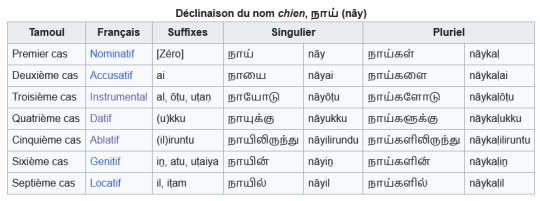
Dr. Schiffman quotes another scholar (Arden 1942) giving 8 cases for modern LT, as in common in "native and missionary grammars", i.e. those written by native Tamil speakers or Christian missionaries. It's the list from above, plus the Vocative case (which is used to address people, think of the KJV Bible's O ye of little faith! for an English vocative)
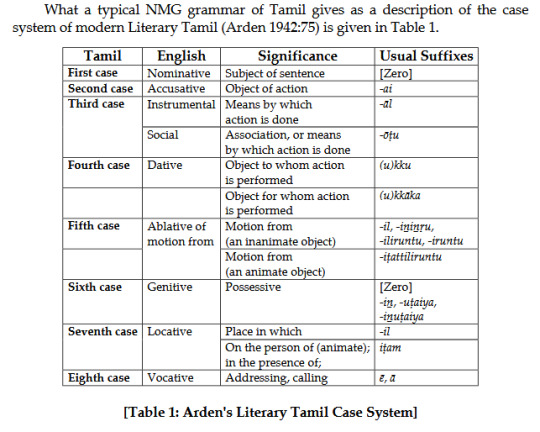
... but hold on, the English wiki for "Tamil grammar" has 10 cases:
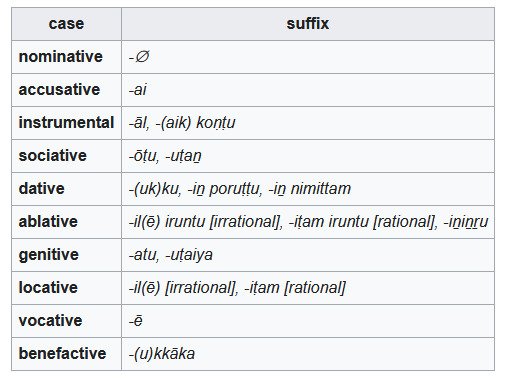
OK, so each page adds a few more. But hold on, why are there multiple suffix entries for each case? Why would you use -otu vs. -utan, or -il vs -ininru vs -ilirintu? How many cases are there actually?
Dr. Schiffman explains why it isn't that easy:
The problem with such a rigid classification is that it fails in a number of important ways ... it is neither an accurate description of the number and shape of the morphemes involved in the system, nor of the syntactic behavior of those morphemes ... It is based on an assumption that there is a clear and unerring way to distinguish between case and postpositional morphemes in the language, when in fact there is no clear distinction.
In other words, Tamil being an agglutinative language, you can stick a bunch of different sounds onto the end of a word, each shifting the meaning, and there is no clear way to call some of those sounds "cases" and other sounds "postpositions".
Schiffman asserts that this system of 7-8 cases was originally developed for Sanskrit (the literary language of North Indian civilizations, of similar antiquity to Tamil, and the liturgical language of Vedic Hinduism) but then tacked onto Tamil post-facto, despite the languages being from completely different families with different grammars.

Schiffman goes through a variety of examples of the incoherence of this model, one of my favorites quoted from Arden 1942 again:

There is no rule as to which ending should be used ... Westerners are apt to use the wrong one. There are no rules but you can still break the rules. Make it make sense!!
Instead of sticking to this system of 7-8 cases which fails the slightest scrutiny, Dr. Schiffman instead proposes that we throw out the whole system and consider every single postposition in the language as a potential case ending:
Having made the claim that there is no clear cut distinction between case and postpositions in Tamil except for the criterion of bound vs. unbound morphology, we are forced to examine all the postpositions as possible candidates for membership in the system. Actually this is probably going too far in the other direction ... since then almost any verb in the language can be advanced to candidacy as a postposition. [!!]
What Schiffman does next is really cool, from a language nerd point of view. He sorts through the various postpositions of the language, and for each area of divergence, uses his understanding of LT and ST to attempt to describe what shades of meaning are being connoted by each suffix. I wouldn't blame you for skipping through this but it is pretty interesting to see him try to figure out the rules behind something that (eg. per Arden 1942) has "no rule".


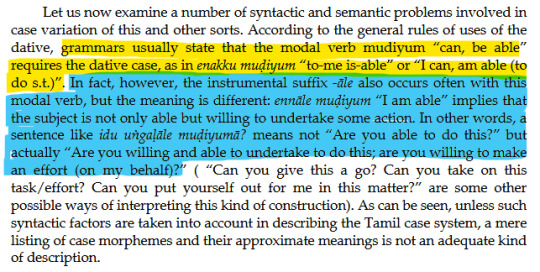
On the "extended dative", which connotates something like "on the behalf of" or "for the sake of":
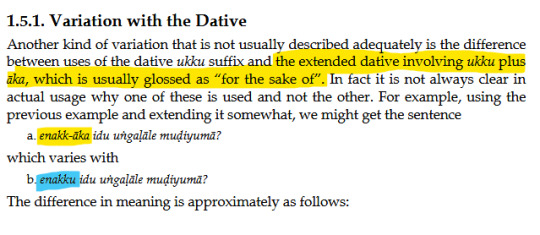

I especially find his analysis of the suffix -kitte fascinating, because Schiffman uncovers a potential case ending in Spoken Tamil that connotes something about the directness or indirectness of an action, separate from the politeness with which the person is speaking to their interlocutor.

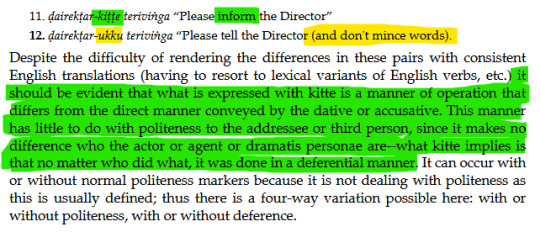
Not to blather on but here's a direct comparison with Finnish, which as stated earlier has 15 cases and not the 7-8 commonly stated of Tamil:

What Schiffman seems to have discovered is that ST, and LT too for that matter, has used existing case endings and in some cases seemingly invented new ones to connote shades of meaning that are lost by the conventional scholar's understanding of Tamil cases. And rather than land on a specific number of cases, he instead says the following, which I find a fascinating concept:
The Tamil Case System is a kind of continuum or polarity, with the “true” case-like morphemes found at one end of the continuum, with less case-like but still bound morphemes next, followed by the commonly recognized postpositions, then finally nominal and verbal expressions that are synonymous with postpositions but not usually recognized as such at the other extreme. This results in a kind of “dendritic” system, with most, but not all, 8 of the basic case nodes capable of being extended in various directions, sometimes overlapping with others, to produce a thicket of branches. The overlap, of course, results from the fact that some postpositions can occur after more than one case, usually with a slight difference in meaning, so that an either-or taxonomy simply does not capture the whole picture.
How many cases does Tamil have? As many as its speakers want, I guess.
162 notes
·
View notes
Text




Sunderland's Royal Jewel Vault (56/∞) ♛
↬ Queen Matilda Mary's Wedding Tiara
In June 1881, Martha, Dowager Duchess of Westminster and the last surviving aunt of George I, had a meeting with her nephew. The sixty-five-year-old duchess was, like most of Sunderland’s aristocracy, a descendant of the Prussian entourage that followed Louis I to North America in the 1780s. The duchess alerted George of the royal family’s waning German heritage. Despite being a Hohenzollern descendant, George spoke poor German. He had a British mother and a Russian wife. His eldest daughter had married a French prince, France being at loggerheads with Prussia for most of the previous decade. While his second daughter, Princess Grace, married into the German Imperial family, she was shunned in Berlin for her North American heritage. Throughout the early 19th century, German cultural influence had weakened in Sunderland, with American and British influence becoming more prominent. George, who both envied and admired the German Empire as a world power following the Franco-Prussian War, decided then that his eldest son and heir, Prince George Nicholas, would marry a German princess. The following year, George Nicholas was sent to Chartres, France. What appeared to be an educational trip and an opportunity visit to his elder sister, Princess Athena, was in reality a ploy to manufacture an introduction between Georgie and Princess Matilde Marie of Klebelsberg-Thumburg. Maudie, as she was called by her family, had been one of the many potential brides Athena had been tasked with cross-examining on behalf of King George. Other candidates included Princess Viktoria of Prussia, Princess Elisabeth of Hesse and by Rhine, and Princess Victoria of Baden. Athena was relieved when Matilde Marie made a favourable impression; what had once been her father’s brainstorm was now becoming her responsibility and burden. Athena, who was by this time pregnant with her third child, had spent much of the previous months travailing throughout western Germany—and dealing with the stigma of being a foreigner married to a Frenchman. George Nicholas and Mathilde Marie officially met in Paris on March 12, 1882. Then again at Swabian Hall in May. King George had already decided that Georgie and Maudie should marry, but he wanted to give his son, a debauched playboy with a rebellious streak, the “illusion of choice”. When Georgie returned to Sunderland that August, wedding plans advanced at a breakneck speed. Less than a year later, Princess Mathilde Marie was carted across the Atlantic by the steamship George & Alexandra. The young princess set foot on Sunderlandian soil on April 25, 1883, under a “shower of fanfare and confetti”. She married the Prince of Danforth two days later and was immortalized by her Anglicized name: Matilda Mary.
From her new husband, Matilda-Mary received a gift: a parure of pearls and diamonds. The set of jewelry was dominated by an imposing circlet, a tiara featuring over 1000 brilliant-cut diamonds and weighty circular elements. The Daily Charlatan reported that the princess’s new tiara was the most expensive in the vault. “Fit for the mantle of a future Queen,” Queen Alexandra had remarked. Despite describing the sparkler as “migraine-inducing”, Matilda Mary was photographed in the tiara multiple times, as was her second daughter and namesake, Princess Maud. The tiara, its painful weightiness and imposing size, is an apt metaphor for Matilda Mary’s life in Sunderland. Her marriage with Georgie was not a happy one. Georgie’s infidelities were a constant source of stress for Maudie. By the time Georgie became King Nicholas in 1921, the couple were living “different lives in different houses on different planets.” The tiara disappeared after Matilda Mary died in 1945. While the rest of the parure remained in use within the family, the tiara became a mystery. Answers only came with the 2022 publication of The Jewels of Sunderland, the first authorized account of the history of Sunderland’s royal jewels. The tiara was noted to have stayed with Princess Maud following her mother’s death. Sadly, it was dismantled by King George II after the princess died childless in 1955.
#warwick.jewels#✨#ts4#ts4 royal#ts4 edit#ts4 royal legacy#ts4 legacy#ts4 royalty#ts4 monarchy#ts4 screenshots#sims 4#simblr#the sims 4#sims#the sims community#sims 4 screenshots#my sims#ts4 simblr
50 notes
·
View notes
Text
Ahead of Eurovision 2024
I was listening to Eden Golan's song, Hurricane.
youtube
At first, it didn't seem to me like it stands out. I'm one of the people who prefers my Eurovision song less on the power ballad side of things, so this being in that genre...
But then I found myself haunted by the lyrics. By specific lines. Singing them to myself quietly, over and over again. I had to listen to the song again.
And it got to me, it really did, I haven't stopped listening to or singing it since, so I guess I needed to share a bit.
There's more than one hint that this is a song about mourning and survival. Lines like, "someone stole the moon tonight, took my light" can be interpreted in more than one way. But they become less ambiguous when combined with ones like, "holding on in this mysterious ride," when the mysterious ride we're all on is life itself. It makes it clearer that this isn't just a break up song. Then it becomes even more explicit with, "we shall pass, but love will never die."
The imagery in the videoclip is also telling, that ending when Eden is looking up, much like many do when talking to or thinking about a loved one that we have lost.
But the line that gets to me the most, the first one that took over my brain? "I'm still broken from this hurricane."
We all get what this song is about, in the wake of what happened here in October 2023, and since. And I am broken. So many Jews and Israelis are. As one survivor said (his words have haunted me first, then I heard them echoed in this song): "We are broken, but strong." That's exactly what the song is about, deeply feeling the pain and the tragedy, the loss, this impossible to accept grief, and still trying to find a way to live with it, to survive not just the horrors of a massacre, but the trauma that follows it as well.
The other line that affects me the most is directly related to this, "baby, promise me you'll hold me again." Because I have spent the last 5 months watching the news, seeing the funerals, and hearing people breaking down, as they say a variation of this to their loved ones, who are gone. Asking for a promise that can't be made, or fulfilled, and knowing that it can't, even as the request is being uttered. I hear their voices breaking around their words, whenever I listen to or sing this line.
The videoclip is also infused with imagery that's related to the massacre of over 360 people at the Nova music festival (and the kidnapping of 40 more from that scene), which is in a way very apt for music lovers. The images show dancers in what looks a lot like a nature party, just like Nova, and since the massacre happened when the music festival was meant to reach its peak, a long night of music and dancing climaxing around sunrise, that's exactly what we see, a move from the "moon light" throughout most of the videoclip, to the "sunrise" at the end.
But in the case of this "sunrise," Eden can smile, she can find comfort, she can sing a few words in Hebrew that reflect hope, about that little light that's left even when the moon's been stolen.
She's bringing the song to a beautiful, emotional closure.
Obviously, it can't be ignored that this is a re-write. The original song (which was called October Rain) was disqualified as "political."
You can read the original lyrics here. They're almost identical. I heard an interview with the song writers, who said they weren't even told what got their song disqualified, so they had to guess what the Eurovision Broadcasting Union had in mind, when they called an expression of our pain, and our strength at the face of that, "political."
I admit, I find it very hard to accept this disqualification. It's not like there isn't precendent for countries at the Eurovision expressing pain (including the kind originating from political circumstances) through their songs.
If you take the wildly popular Ukraine 2007 entry, the singer was quite obviously singing "Russia goodbye," with allusions to Russian interference in Ukrainian elections while wearing outfits reminiscent of Soviet uniforms. And that wasn't called political, because "Russia goodbye" was changed into gibberish that still sounds like it (and in recent performances, it was blatantly sang like that).
If you take the much talked about Croatia 2023 entry, it was about the Russian invasion of Ukraine in 2022, and also criticized Belarus' tyrant kissing Russia's tyrant's ass, by referencing the tractor that Lukashenko bought for Putin, while the band members played with military weapons and uniforms on stage. And that wasn't disqualified for being political.
If you take the Ukraine 2016 entry, that was explicitly singing about their pain over what the Russians did to the Tatar population in Crimea in 1944, with clear allusions to what Russians did when they invaded Ukraine's Crimean peninsula in 2014. And that wasn't called "political" either.
Even this year, we have the entry from The Netherlands being political, with both the lyrics and videoclip referencing the borderless Europe (which IS a political issue, as Brexit, if nothing else, had made clear). I've seen people pointing out online that the song isn't political, because the whole borderless Europe thing is a metaphor for the singer's grief for his father/parents. I have no problem with that reading, but let's acknowledge that there could have been many metaphors for that, and he chose a political one.
So why is Jewish pain treated differently? Why is our pain labeled "political," when the metaphors for it in the songs aren't that, there are no specific political mentions of people or organizations in the song (unlike the Georgia 2009 entry, which slipped Putin's name into the song's title) in either version, when there are no political statements being made in the song, there's just expressing our pain, and trying to find a way to cope with it?
This WAS the biggest massacre of Jews since the Holocaust, and expecting Jews not to write about it, not to sing about it, not to try to process it through art... Our pain is not political. It's human. When Ukraine won in 2022 with a song that wasn't originally political, but became one, as it was adopted by Ukrainians suffering from a war that they did not choose, but had to fight, singing it wherever they were displaced (I remember the winners, Kalush Orchestra, coming to Israel to sing it for and with Ukrainian refugees who found shelter here), I thought it was quite obvious, even for people who don't like politics at Eurovision, why the song won, and why everyone overlooked the fact that it was only partly based on its qualities as a Eurovision song. I don't expect Israel to win, I very much expect that, even as Israelis embrace this song about our pain during a war, that we didn't choose, but have to fight, and while hundreds of thousands of us are still displaced, we will get a lot of hatred, instead of understanding and sympathy. But I still have to speak up. I still have to point out that treating Israeli or Jewish pain differently is wrong.
(as a footnote, I wanna get ahead of the usual, "Why is Israel allowed to participate in Eurovision to begin with? It's not in Europe!" comments, while I haven't come across the same ritual for certain other Eurovision participants, like North African Morocco, just-as-Asian-as-Israel Lebanon, transcontinental {despite some of these countries only being considered European culturally, while geographically speaking, they're fully Asian} Georgia, Russia, Cyprus, Turkey, Azerbaijan and Armenia, and the one that's a continent all on its own, Australia. They all have the right to participate, because they all belong to the European Broadcasting Union. Just like Israel)
#israel#eurovision#esc#esc 2024#esc 24#antisemitism#israeli#israel news#israel under attack#israel under fire#anti terrorism#antisemitic#antisemites#jews#jew#judaism#jumblr#frumblr#jewish#eurovision 2024
257 notes
·
View notes
Text
Due to an unfortunate occurrence, I will now be overtaking Charlotte's Christmas shopping duties, not that 'duties' would be an apt description for it.
Nevertheless, I was informed of her infirm state, and I've taken it upon myself to do whatever it takes to make her happy, whether it be shopping or buying her an entire store (sorry for the expenses, Howard)
Please just mention what you'd like to buy, and I'd be willing to oblige.
@steve-rogers-1940s
@thatlittleguyfrombrooklyn
@agentiriscarter
@iwasmadetobeasoldier
@proud-owner-0f-americas-ass
@justawhitewolf
@natt-romanoff
@clintbarton-thearrowguy
@official-tasha-romanoff
@official-alpinebarnes
@official-buckybarnes
@multifandomer537
@multiverse-peterbparker
@the-golden-poster-boy
@theironcan
@oh-to-be-a-murderer
@serenastark-official
@peterparker-who
@the-real-peterparker
@ned-guyinthechair
@the-best-black-widow
@your-fav-russian-assassin
@the-ironman
@goddess-of-birds
@moth-to-the-flames
@you-know-me-you-do
@mr-jarvelous
@mysticmasterstephenstrange
@strangeofficial
@loganschuchuzinho
@merc-with-a-mouth-69
@merc-with-the-m0uth
@moon-barnes
@dancepooool
@over-bi-the-wayside
@capt-carter-mostly-official
@daniel-barnes-the-ghost
@jade-lopez-maximoff
@emma-hope-stark-official
@really-steve-rogers
@therealquicksilver
@crazyinlovewithmarvel
@gloriouspurposeonasgard
@ronniemaximoff-danvers
@official-wandamaximoff
//if I have forgotten someone TAG THEM
//also can we pretend it’s still Christmas Eve thaaaanks
38 notes
·
View notes
Text
Transcript of a speech to the French Senate: Mr. Claude Malhuret. I am not sure of his leanings politically, as I am not familiar with French politics, but it's apt in it's descriptions of the current US coup regime.
“President, Mr. Prime Minister, Ladies and Gentlemen Ministers, My dear colleagues,
Europe is at a critical turning point in its history. The American shield is crumbling, Ukraine risks being abandoned, Russia strengthened.
Washington has become the court of Nero, a fiery emperor, submissive courtiers and a ketamine-fueled jester in charge of purging the civil service.
This is a tragedy for the free world, but it is first and foremost a tragedy for the United States. Trump’s message is that there is no point in being his ally since he will not defend you, he will impose more customs duties on you than on his enemies and will threaten to seize your territories while supporting the dictatorships that invade you.
The king of the deal is showing what the art of the deal is all about. He thinks he will intimidate China by lying down before Putin, but Xi Jinping, faced with such a shipwreck, is probably accelerating preparations for the invasion of Taiwan.
Never in history has a President of the United States capitulated to the enemy. Never has anyone supported an aggressor against an ally. Never has anyone trampled on the American Constitution, issued so many illegal decrees, dismissed judges who could have prevented him from doing so, dismissed the military general staff in one fell swoop, weakened all checks and balances, and taken control of social media.
This is not an illiberal drift, it is the beginning of the confiscation of democracy. Let us remember that it took only one month, three weeks and two days to bring down the Weimar Republic and its Constitution.
I have faith in the strength of American democracy, and the country is already protesting. But in one month, Trump has done more harm to America than in four years of his last presidency. We were at war with a dictator, now we are fighting a dictator backed by a traitor.
Eight days ago, at the very moment that Trump was rubbing Macron’s back in the White House, the United States voted at the UN with Russia and North Korea against the Europeans demanding the withdrawal of Russian troops.
Two days later, in the Oval Office, the military service shirker was giving war hero Zelensky lessons in morality and strategy before dismissing him like a groom, ordering him to submit or resign.
Tonight, he took another step into infamy by stopping the delivery of weapons that had been promised. What to do in the face of this betrayal? The answer is simple: face it.
And first of all, let’s not be mistaken. The defeat of Ukraine would be the defeat of Europe. The Baltic States, Georgia, Moldova are already on the list. Putin’s goal is to return to Yalta, where half the continent was ceded to Stalin.
The countries of the South are waiting for the outcome of the conflict to decide whether they should continue to respect Europe or whether they are now free to trample on it.
What Putin wants is the end of the order put in place by the United States and its allies 80 years ago, with its first principle being the prohibition of acquiring territory by force.
This idea is at the very source of the UN, where today Americans vote in favor of the aggressor and against the attacked, because the Trumpian vision coincides with that of Putin: a return to spheres of influence, the great powers dictating the fate of small countries.
Mine is Greenland, Panama and Canada, you are Ukraine, the Baltics and Eastern Europe, he is Taiwan and the China Sea.
At the parties of the oligarchs of the Gulf of Mar-a-Lago, this is called “diplomatic realism.”
So we are alone. But the talk that Putin cannot be resisted is false. Contrary to the Kremlin’s propaganda, Russia is in bad shape. In three years, the so-called second largest army in the world has managed to grab only crumbs from a country three times less populated.
Interest rates at 25%, the collapse of foreign exchange and gold reserves, the demographic collapse show that it is on the brink of the abyss. The American helping hand to Putin is the biggest strategic mistake ever made in a war.
The shock is violent, but it has a virtue. Europeans are coming out of denial. They understood in one day in Munich that the survival of Ukraine and the future of Europe are in their hands and that they have three imperatives.
Accelerate military aid to Ukraine to compensate for the American abandonment, so that it holds, and of course to impose its presence and that of Europe in any negotiation.
This will be expensive. It will be necessary to end the taboo of the use of frozen Russian assets. It will be necessary to circumvent Moscow’s accomplices within Europe itself by a coalition of only the willing countries, with of course the United Kingdom.
Second, demand that any agreement be accompanied by the return of kidnapped children, prisoners and absolute security guarantees. After Budapest, Georgia and Minsk, we know what agreements with Putin are worth. These guarantees require sufficient military force to prevent a new invasion.
Finally, and this is the most urgent, because it is what will take the most time, we must build the neglected European defence, to the benefit of the American umbrella since 1945 and scuttled since the fall of the Berlin Wall.
It is a Herculean task, but it is on its success or failure that the leaders of today’s democratic Europe will be judged in the history books.
Friedrich Merz has just declared that Europe needs its own military alliance. This is to recognize that France has been right for decades in arguing for strategic autonomy.
It remains to be built. It will be necessary to invest massively, to strengthen the European Defence Fund outside the Maastricht debt criteria, to harmonize weapons and munitions systems, to accelerate the entry into the Union of Ukraine, which is today the leading European army, to rethink the place and conditions of nuclear deterrence based on French and British capabilities, to relaunch the anti-missile shield and satellite programs.
The plan announced yesterday by Ursula von der Leyen is a very good starting point. And much more will be needed.
Europe will only become a military power again by becoming an industrial power again. In a word, the Draghi report will have to be implemented. For good.
But the real rearmament of Europe is its moral rearmament.
We must convince public opinion in the face of war weariness and fear, and especially in the face of Putin’s cronies, the extreme right and the extreme left.
They argued again yesterday in the National Assembly, Mr Prime Minister, before you, against European unity, against European defence.
They say they want peace. What neither they nor Trump say is that their peace is capitulation, the peace of defeat, the replacement of de Gaulle Zelensky by a Ukrainian Pétain at the beck and call of Putin.
Peace for the collaborators who have refused any aid to the Ukrainians for three years.
Is this the end of the Atlantic Alliance? The risk is great. But in the last few days, the public humiliation of Zelensky and all the crazy decisions taken in the last month have finally made the Americans react.
Polls are falling. Republican lawmakers are being greeted by hostile crowds in their constituencies. Even Fox News is becoming critical.
The Trumpists are no longer in their majesty. They control the executive, the Parliament, the Supreme Court and social networks.
But in American history, the freedom fighters have always prevailed. They are beginning to raise their heads.
The fate of Ukraine is being played out in the trenches, but it also depends on those in the United States who want to defend democracy, and here on our ability to unite Europeans, to find the means for their common defense, and to make Europe the power that it once was in history and that it hesitates to become again.
Our parents defeated fascism and communism at great cost.
The task of our generation is to defeat the totalitarianisms of the 21st century.
Long live free Ukraine, long live democratic Europe.”
-Claude Malhuret speaking to the French Senate Tuesday March 4 2025.
#I'd quibble about the US not supporting aggressors against allys#They've definitely supported plenty of aggressors in the global south. but currently this speech is an apt descriptor of the betrayal
13 notes
·
View notes
Note
Why do you think there’s such a strong military motif associated with Duck Guy throughout the show? I’ve always thought that it was because he’s the one who cares the most about having a routine/‘order’ in the show (Or at least as close to an order as the surreal world of the show allows them to have). This certainly hit me in the last episode the most where it almost sounds like Duck is nearly brought to tears when Yellow Guy isn’t talking and acting like he typically does. There are other characteristics with Duck that I believe could me closely associated with militaristic ones (Such as his anger and desire to be the center of attention in their lessons), but wanting their world to keep sticking to its routine and not enjoying change at all are the main traits that stuck out to me the most.
OKAY NO INTERESTING QUESTION AND VEEERY INTERESTING TAKE HERE I LOVE ITTT I LOVE THIS ASK I LOVE IT HEREEEE !! OKAY! OKAY!
First of all I do think it’s VERY sweet that Duck sounds like he’s about to cry in episode 6 it’s very sweet and very funny to me.
Second- I’ve seen a lot of takes on his weird little military thing!! The oddest of those takes (TO ME) has been the idea that he somehow served. At some point. In some sort of legitimate puppet war. MY interpretation of his little puppet thing tends to lend a bit closer to what you think!
So, personally, I see all three of them as autistic (big shocker) and his intense military interest (hyperfix maybe...) REALLY reads to me less like someone with actual experience with it, MORE like a violent, weirdo, shut-ins IDEA of what it’s like. Which makes sense to me! It’s a pretty apt combination of a lot of his expressed interests
(violence,
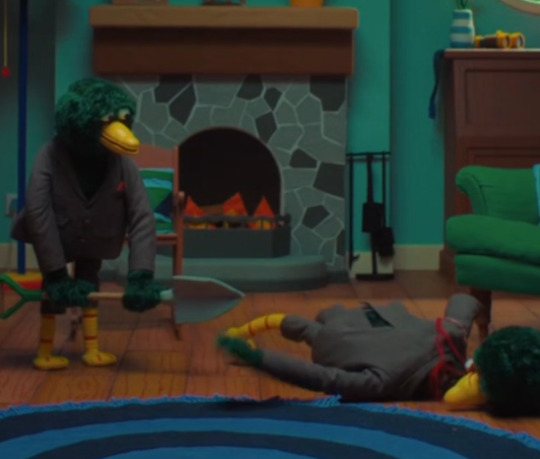

technology,

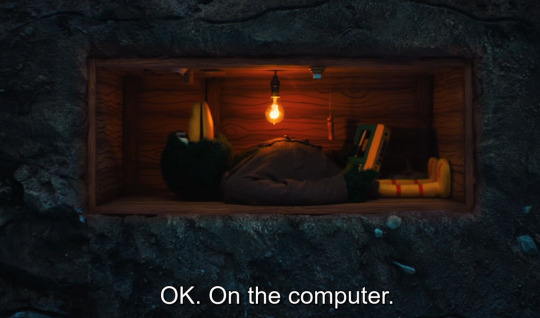

order/routine thing you pointed out,
repetition,
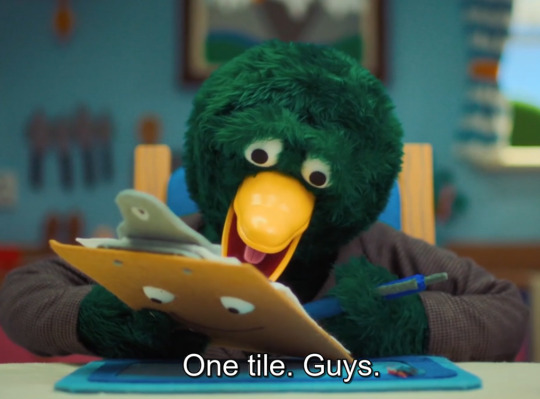
his recurring thing about respect
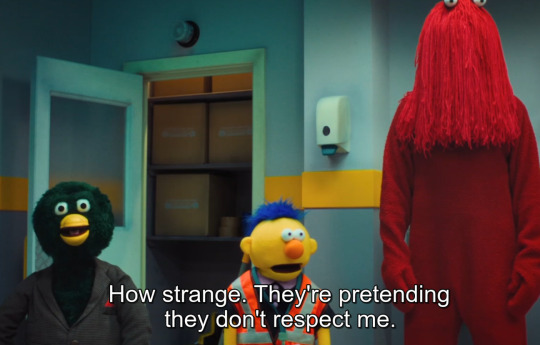


it’s like a perfect venn diagram of stuff he would be into! It makes a lot of sense to me, actually. I think he talks about the military the way we talk about the guys tbh like same hat different head type deal. In my head he's like. At his chair like WHO WANTS TO HEAR ABOUT THE RUSSIAN MILITARY BEAR FROM WORLD WAR TWO FOR 45 MINUTES and YG is like YAAAAAAAAAY and RG is like you already. We’ve heard this one. We know how it goes. You don’t have to say it again.
I also think the routine thing is a very autistic thing lol! I know me personally, I like knowing what i Have To Do in a day or else I get kind of restless or aimless and I can’t handle myself well. Like, I’ve gone out before and had plans change on me suddenly and gotten so distraught at just the change in what we were Planning To Do that I almost cried and needed to sit quietly for a minute. From what I can tell it’s a pretty common autism thing!


So to me, the military thing is a hyperfixation for him + the strict adherence/ almost reverence of routine is just an autism thing. But that’s my take! :] Thanks for the message!!
#heeheehee i love getting questions about my favorite boy#i love that you guys are always asking me about my fav boy#be hooonest is it bc i have such a solid evidence based approach? i joke! i know it is! im great!#never lost a fight about this boy never WILL#my dhmis postings
47 notes
·
View notes
Text
War Games
You need to be ready because war between the United States and China is inevitable.
I hate to use the word "inevitable" because it implies that it is preordained, a foregone conclusion irrespective of circumstance or volition. In this instance it is apt because the US has crafted the circumstances and shaped itself internally and externally so that it has no other choice but to engage in conflict.
To fully explain why this is would require a substantially longer post, several posts in fact, at the very least. In summary though, the welfare state created by the New Deal and the activist sentiment cultivated by the Vietnam War and the Civil Rights Movement spurred a reaction by the bourgeoisie, which resulted in the "Reagan Revolution." Proletarian empowerment was to be checked and dismantled at every opportunity and any impediment to corporate power was to be removed. Unions were dismantled. Public Education was attacked. Trusts were to be facilitated in the name of "efficiency."
Over the course of forty years, the players of the US political and economic system have taken steps favorable to themselves which have made reform impossible. Aberration from the desires of the ruling class is treated with extreme intolerance and the heterodox are expelled from "polite society." Alternative conceptions to the current state of things are portrayed as quixotic at best and foreign or evil at worst.
The result is such that any attempt to reform or ameliorate the social, economic, or political status quo of the United States is virtually impossible.
The US's foreign policy goals since the fall of the Soviet Union has been the dissolution of the Russian Federation and the subjugation of the People's Republic of China, as set out in the policy document "Project for a New American Century." 9/11, the invasion of Afghanistan and Iraq, the destruction of Libya, occupation of Syria, etc, etc, have all been stepping stones on the war towards those ultimate goals. Clinton, Bush, Obama, Trump, and Biden have all facilitated those goals.
The problem is that the "United States," by which I mean the bourgeoisie which represent its interested parties, its political facilitators, and its petite-bourgeois factions which occupy its implementation mechanisms, have crafted the internal and external national circumstances so that novel responses to emerging circumstances are impossible.
To give an example, the war in Ukraine proves that its patently impossible for the US to wage war directly against Russia. In terms of production capacity, the United States simply cannot compete. Case in point, the Russian Federation is producing 4.5 million artillery shells per year. The US meanwhile is producing somewhere in the neighborhood of 450,000. The reason this is is because monopolies have hollowed out the US's production capacity. Increasing production would mean decreasing profit, and that would mean bankruptcy, and then no production. So the US government has to guarantee profit in order to guarantee production. Russia and China don't have this defect currently. Part of the reason Russia has been able to out-produce the US is that its production companies and facilities are state owned. The Russian government says "jump" and their MIC says "how high?" Profit isn't the goal, but rather production.
These circumstances aren't entirely alien to the US. During World War 2, the US government intervened heavily in its domestic economy, dictating wages and benefits, ordering production in support of its war effort. Now though the tail is wagging the dog. In the name of the "economy," monopolies dictate economic and state policy. We saw this recently when the CEO of Delta airlines got the isolation period for covid cut from two weeks to five days.
So we have is a situation where the US can't achieve its goals because of its own inadequacies. If the US wanted to achieve parity with its rivals, it would have to at the very least assume the sort of state-directed production that its rivals have. However, currently that isn't possible because the monopolies which control economic production enjoy control over the state which is ostensibly supposed to regulate it. Put another way, in Russia and China, the state dictates economic activity. In the US, the economy dictates political activity. To use an American saying, "the inmates are running the asylum."
These circumstances cannot be reformed as they currently are. We saw in 2016 that attempts to do so were legally thwarted. If the political system cannot be restructured so that the people's will is preeminent before the will of the bourgeoisie, then the will of the bourgeoisie will dominate. That means that economic monopolies will continue their stranglehold over policy, and profit will retain preeminence before any other consideration, including militaristic victory.
The significance of Taiwan currently is that it accounts for at least half of the planet's semiconductor microchip production. This produces a dilemma for the United States. This essential resource is at least de jure in the hands of an ideological enemy and a presumed economic subordinate. Furthermore, it has no way of ameliorating this state of affairs without military intervention. To the first part, this state of affairs would give China de facto control over US economic policy, both foreign and domestic, as it would give Beijing control over how many microprocessors the US has access to to put into its various domestic products as well as the military hardware it requires to enforce its domestic policy. To the second part, in its efforts to crush the working class all those skilled trades necessary to facilitate its own domestic production, along with the educational institutions necessary to impart the knowledge and expertise for their creation, have been systematically gutted by the bourgeoisie.
In short, if the United States started today to try and achieve the productive capacities currently existing in China and Russia, it would be at least ten years before it could accomplish what either of its adversaries are currently capable of. It lacks the skilled personnel. It lacks the machinery necessary. Its institutions lack the candidates or the program to train its citizens at scale. It very simply lacks the capability to produce more than its limited quantities of boutique weaponry, which means it cannot possibly compete with its chosen adversaries.
The rational response to these facts would be to adjust its course in relation to the existing circumstances. The period of American hegemony outlined in the PFANAC is as unrealistic as traveling to the moon on a hot air balloon, so rational course of action would be to adjust policies and expectations accordingly. Unfortunately, these adjustments cannot be made. They would require upsetting the dominance of the monopolies over the American political and economic status quo, and the monopolies are unwilling to let that happen and the US government is incapable of making that happen. For the American economy to continue, the monopolies must continue to exist as monopolies, and also for American politics to continue. It is a reciprocal relationship, where reformers that endanger corporate profits like Sanders are kept out of positions of power, so that those in power can continue to guarantee corporate profits. One hand washes the other, and nothing is allowed to fundamentally change.
The problem, as any Marxist could tell you, is that change is the fundamental state of things. In spite of the war and sanctions, Russia's economy is strengthening while Europe's is weakening. China alone has more than twice the consumers as all of NAFTA combined. The bottom line is that the United States simply cannot compete, and what's more is that it has fashioned itself into such a state so that it can never, ever do so, because the necessary changes are simply impossible to achieve and implement while also keep profits up and proles down. To keep things as they are, change is utterly impermissible, in spite of how devastatingly necessary it might be.
Yet regardless, the status quo is not only viewed by the bourgeoisie as the natural state of things, but totally essential. Unable to escape their own ideology, they are restricted by its prescriptions. The United States must, must, dominate not only Russia, and China, but the entire world. It cannot do so economically, and yet it cannot alter itself so that it may do so. In terms of production the US can never, ever surpass China in its current state, but at the same time it cannot realistically alter itself to do so. The American bourgeoisie has achieved victory over the American working class, but in so doing it has forfeited the struggle to dominate internationally. It has very little to offer in terms of real goods. Its only useful product is its currency and the ascendance of BRICS severely limits that's lifetime. Since 2001 the US has let its diplomatic strength atrophy, and in its hubris reality has increasingly passed it by.
If it has no real goods to offer, no useful currency, and no means of persuasion, then the only thing left that the US has to ensure its necessary, is essential dominance is its military weaponry. While much of it is dated and inherited from the First Cold War, it still has the capacity to wreak fearful destruction, especially its nuclear arsenal.
We see the evidence of this fact even now. The US's puppet Ukraine cannot possibly win against Russia. This was a fact even before the start of the most recent phase of this conflict in 2022. Yet in spite of the unrelenting slaughter of the Ukrainian people the conflict continues because the US as instigator of this war has no other alternative. It cannot allow peace to break out. It cannot pursue an alternative to war. It cannot even fathom a world where it doesn't dictate the state of affairs. So in spite of bleeding itself dry trying to wear down an enemy that surpasses it in virtually every capacity, it insists on continuing, because the alternative cannot possibly be countenanced.
Russia, in spite of its growing strength, is nowhere near the level that China currently enjoys. If the United States cannot even defeat Russia, it would be absurd to court conflict with China, especially considering how much the US relies on Chinese goods for, well, practically everything. The pandemic "shutdown" saw the US practically on the verge of collapse and panic as essential goods grew scarce. Still, the US continues to ratchet up tensions with China, provoking it, while preparing itself for war insofar as its capable. For the United States and its controlling monopolies, there is no other choice. Profit must be assured, which can only come at the expense of its imperial subjects, and without any other alternative those subjects must be maintained at the barrel of a gun—or the tip of a nuclear weapon.
#us politics#us imperialism#russia#china#united states#capitalism#ukraine conflict#taiwan conflict#taiwan#economics
23 notes
·
View notes
Text
Sova x reader; Lucky catch pt.2!
part 1 - part 3 - part 4 - part 5 - part 6
word: 3700 ish
🍀lucky catch🍀
song (It was stuck in my head all morning): Apt. by Rose- Bruno Mars
NO WARNINGS
note: I was planning to make Lucky catch in a few parts- idk how many- I had the idea on a whim and so- thanks to my job being dead ASF still I shall continue :D. Anyways, enjoy!
🍀🍀🍀🍀🍀🍀🍀🍀🍀🍀🍀🍀🍀🍀🍀🍀🍀🍀🍀🍀🍀🍀
And so, You finally started to work as an actual Valorant agent, now back at the protocol's headquarters; you had set up your own dorm room, making it all cozy to your liking. You had set up LEDS, fairy lights, a few succulents and candles, a bookshelf full of your favorite books, some trinkets and cool things you had found while traveling around- like crystals you had found yourself, a twig in the shape of a lizard, a fossil and a few other things- making a warm and cozy room for yourself. You didn't mind the randomness of some objects displayed- it was yours and anyways, who was actually going to complain? It's your room-
Training was also quite interesting, as when you had first joined, you had to go through some assessment training, seeing just how your powers worked and also assessing your body strength. It was quite interesting to test your body strength as you never really had a number to put on it- your main source of training came from practicing your techniques with your movement and speed while using your vine to swing, climb and grab stuff around.
Turns out you had not only quite the body strength from acting like a knock off spiderman, but also turns out you had a lot of stamina- like a lot. You were able to keep up with Neon for much longer than anyone could expect- sure, you weren't on her level of high energy, but you could still hold your own on following her around, swinging around with your vine while she sprinted like a squirrel on red bull. It impressed most the agents in protocol someone was able to keep her pace for longer than a few minutes, and that's just one of the things you did that earned you a lot of respect in the protocol.
And then of course, your favorite thing to do since you settled into the headquarters; messing with Sova. You would've thought that after settling in, having him as your trainer for the assessments and have him literally scold you like a teacher scolds an unruly student- that maybe pestering him wasn't the best idea. But something about pushing him until he inevitably makes you pay for being a brat- it amused you to no ends. Maybe it was because being forced to push harder in training, the extra strength testings he'd do or the extra endurance exercises- you didn't mind them, knowing you would be more than capable to tank in what he threw your way.
And once more, that's what you were up to, in one of your multiple training sessions with the Russian blondie, in which he was making you do the plank and alternating with a few different exercises. ''Damn princess, this feels so dull.'' You commented- and of course calling him princess was somehow a nickname that had stuck no matter the time that had passed since you had saved his ass from falling off the tall building. ''You really won't cut it with that nickname-'' Sova started with a slightly annoyed tone- and when you heard him mutter in his mother tongue, you knew he was about to throw a curveball your way during training. ''What can I say, princess? suits ya-'' You responded with slight sarcasm and a small snort, grinning from your spot on the floor. He was starting to glare down at you, and you knew that you were about to get a harder training session.
''Back in plank position.'' Sova said firmly, his arms crossed. He didn't take out the chronometer this time, already hinting he was going to push you once more. ''Whatever you want, princess.'' You retorted as you got into position, toes and hands supporting your body weight in the plank position. It wasn't too hard to do, though this exercise was the type to get worse with time. So you steadied you breathing as you prepared to hold this position for an undetermined amount of time. What you didn't expect was the additional weight suddenly added to your back, letting out a slightly surprised noise. You looked up at the mirror wall in front of you in the training room, seeing that Sova was sitting on your back at this point.
''Motherfucker-'' You mumbled out as you went back to focusing on you breathing- because even though he was only sitting and not putting his full weight, he was still pretty heavy- and it felt so much worse while doing the plank. ''Excuse you?'' He spoke up, an eyebrow cocking at the cuss you had tossed out from his additional weight- of course not letting it slide. He instead adjusted himself so his full body weight was on you, now letting you have to plank for an undetermined time while supporting this 200 something pound man on your back.
His full weight made it much more difficult, and also forcing you to shut up as you needed to focus on your breathing rather than your retorts. Anyways, wasting breath on retorts now would break your focus and ultimately break your form. And if there was one thing to remember about you- is that you were resilient. You let your head fall to face the floor, shutting your eyes as you focused, tuning out anything else. You felt aching in your abs, which was also climbing up your legs and arms, and at every breath you slowly took, the aching was worsening into a burning sensation. Every extra second seemed to stretch on as the pain in your muscles became more and more vivid- yet still refusing to fall.
''Your holding up well. But how long can you actually hold? maybe what, 30 more seconds at best?'' Sova taunted, glancing up at the clock on the wall of the training room. Sure, he wasn't timing it on the chrono, but he was paying attention to the clock, counting the time of your hold that way. You had already lasted a whole 2 minutes with him on your back, and from how you were starting to sweat up, he assumed you would let go soon. His attention turned to the mirror, observing you through it, seeing how your head was dropped towards the floor, ponytail dangling down and brushing the mat on the ground. Your breathing seemed to start to become a bit more rough and he noticed a faint tremble in your legs.
You didn't react to his taunt, fully tuning out the Russian man as you focused solely on your breathing. You refused to give his the satisfaction of being right on his call out- you didn't want to give him any grounds to being right, you wanted the last laugh on this. You felt the vivid burn starting to take over your limbs more and more, ignoring it becoming more of a challenge as seconds ticking by. You could feel the sweat beading on your face, dripping off to splatter onto the mat below- feeling sweat pool through your clothes from where Sova's body weight was pressed onto. You couldn't care less that he was quite literally sitting into your sweat- your pride was not set onto that detail.
Sova's eyes darted back to the clock on the wall, watching as seconds ticked by, slowly running to the 30 second marker he had guessed you would drop at. But every extra second that ticked by, he was impressed to see your resilience to hold, your refusal to give up passed the marker given. As if to prove a point, an unsaid one between the two of you, where his taunts became a challenge to you. He kept count of the time, watching as the small tremble in your arms and legs seemed to worsen, but still somehow refusing to fall, even after the 3 minute marker. He waited, though he was starting to feel your sweat seep through his own clothes, he too, was now curious to see just how long you would hold simply out of spite.
A few more seconds ticked by, and finally, at 3 minutes and 22 seconds, you fell, letting out a slight strangle noise, almost resembling one of a deflated squeaky dog tog. To be fair, when you fell, Sova also fell on top of you, effectively squishing you. He was quick to get up- a bit concerned by the noise you had just made- now crouched besides you. ''3 minutes and 22 seconds, that was impressive... But are you okay? That fall did not seem pleasant-'' He asked, his voice tinged with concern as he waited for a response on your end.
''Pain...'' You mumbled out- still laying face first into the mat as you mumbled out your words between breaths. The fall definitely didn't help- Sova's extra weight seemed to have knocked the wind out of you. You could also feel cramps slowly make their way to your legs from pushing a bit too far this time, once again. You tried to take smaller breaths to not have to deal with the pain in your back from getting the wind knocked out of you. This was probably the one time you thought to yourself 'maybe I should have stopped a bit before.'
''You pushed too far, (Y-N). Seems like the consequences to your actions caught up to you.'' Sova said with a small sigh, looking over your laid out body- he could literally see your leg muscles start to contract, a sign a cramp would follow suit soon enough. Instead of continuing with his reprimands, he moved to sit behind you, lifting your legs with his hands so he could properly position himself to stretch them for you. Moving slowly, he flexed your legs to stretch them out, hands massaging the muscles before they could start to form any painful cramps.
You were still focusing on catching your breath, but definitely grateful that he was working on your legs to avoid any injury. You didn't have the energy at the moment to move on your own, so having him do it for you was something you would have to thank him for afterwards. You spent a few more minutes laying face down on the mat while he stretched and massaged your legs, chasing away and cramps that could have followed. You finally propped yourself onto your elbows once breathing wasn't as hard, feeling a sliver of energy returning to you. You looked into the mirror on the wall, seeing that the Russian agent was focus on what he was doing behind you, watching as he held your ankle with a hand, using his other to push your leg to the desired spot and hold it like so to stretch.
You quietly observed him for a few moments, your breathing returning to normal as he quietly worked on you. You finally broke the silence, voice a bit quieter from the lack of energy. ''You make it look like I'm one of those really bendy dolls- the ones with multiple joints to bend in inhumane ways.'' You commented as you watched him work, just a slight hint of a tease in your voice- but nothing near how it was earlier. ''Well, you are pretty flexible, considering your muscle mass.. So I can see why it looks that way-'' Sova muttered out as he finished up his work behind you, laying both your legs down straight before getting up, fetching you a water bottle to sip on.
You finally turned yourself, sitting with your legs straight out to let them rest a while longer. You grabbed the water bottle he handed you, taking a few small sips before speaking up once more. ''Thank you princess- needed that.'' You said, setting down the water bottle as you looked up at Sova, who let out a deep sigh. ''Why do I even try- You really won't stop with that stupid nickname no matter what!'' He exclaimed, a look of slight annoyance and defeat on his face. ''Sadly for you, it kinda stuck... So yeah, it's just coming out on it's own at this point.'' You said with a small laugh, a tired smile making its way to your lips. ''Of course it did...''He muttered out, shaking his head in slight disbelief. ''...On a different note, are you okay to walk back to your dorm on your own?'' He asked as he gestured to your legs, concern etched onto his face as he set aside his annoyance over the nickname.
''You offering to carry me? Oh me oh my, aren't I just the luckiest-'' You said as a grin slowly grew. And his concerned expression changed to one of annoyance once more, facepalming as you spoke. Of course, you would find anything he said to twist it into a tease or a taunt of any kind for him- it was stronger than you. ''I take that back, if you have the energy to mock me, you have the energy to walk.'' Sova replied firmly, turning to start packing his gym bag up now that training was over. You giggled as you watched him leave, annoyed and seeming bothered with you, once again. ''You're adorable, princess!'' You taunted once more as he left, grinning as you spoke. Now alone in the training room, you took some extra time to finally push yourself up to head back to your own dorm, more than ready to shower and crash out.
🍀🍀🍀🍀🍀🍀🍀🍀🍀🍀🍀🍀🍀🍀🍀🍀🍀🍀🍀🍀🍀🍀
Back in your dorm, crashed in bed, you had Neon in your room, chattering away with you- she had texted you minutes after you were out the shower and relaxing in your bed, all cozied up in pajamas already. You couldn't careless about changing as she came to chat, she herself was already in pajamas too- sitting on one end of your bed as you were comfily resting on the other end, pillows and blankets serving to make comfier sitting spots for you both. You two were gossiping and talking away- what you two were often doing in general.
''Have you heard, Yoru has started to like- semi flirt with Skye...If you can call it flirting-'' Neon said, a laugh escaping her as she spoke, a grin etched onto her face. ''God- what did he say something like 'you're a pretty flower, flower girl'? no even that's too corny for him-'' You said as you were trying to imagine just what flirting was for Yoru. ''Even worse, he just said you look better today.' in the driest tone ever, than teleported away. Like- it was an attempt but even I was cringing at the scene.'' Neon said, grinning widely as she shook her head. ''Oh god- that's... Actually that's what I would expect from him-'' You snorted, also grinning in an amused way. ''What did Skye say though?'' You asked curiously, wanting to know more about this gossip.
''Well she kinda spaced out for a second... Then yelled out 'The fuck you mean 'better today?'' then went to look for him. No idea what happened afterwards though, but she looked pissed.'' Neon said once more accompanied with a laugh, finding the whole thing amusing more than anything. ''Sounds about right.'' You retorted with a giggle, the conversation dying down for a short moment as you both giggled at the two older agents poor way of flirting.
''So... You and Sova-'' Neon started off, a small mischievous look in her eyes as she diverted the conversation, grinning. ''Hey now, I thought there was no friendly fire when it came to gossip!'' You retorted with a small smile, knowing exactly where this was going. ''Oh come on! You two have a damn good dynamic- Like excuse me for having hope!'' Neon retorts, her hands up defensively, still grinning widely. ''But he's clueless- I called him adorable more times than I can count, try to train with him at any opportunity- hell I am even doing the morning runs with him- And you know how much I hate getting up early!'' You started to list out some of the attempts you made towards Sova, all which had been met with cluelessness from the blonde man.
Because if there was something that you learned the hard way- is that Sova seems to pass off all those actions as simple friendly gestures. You could probably say 'I love you' and he wouldn't catch on. That was the slightly exasperating part of having a crush on him- which is why you now just took fun in pestering him. It was your mental way of getting 'payback' for his oblivion, as childish as it sounds. ''Yikes, and he still isn't even slightly suspicious? Isn't he supposed to be the most perspective guy in the protocol?'' Neon said, following her remark with a small whistle. ''I know right? Hell, I bet I could slide in a 'I love you' and he would brush it off and continue with the conversation like nothing had happened.''
''I low-key want to see that happen-'' Neon said, a small giggle escaping her at the mental image she was making herself of the situation. And before you could retort anything, someone was knocking at your dorm door, making the two of you quiet down for a moment. Neon jumped up, heading to open the door as the dorms were heavily sound proofed- so calling out to come in wasn't going to cut it. Neon flung open the dorm door a bit too energetically, The door open wide so you could also see who was there.
And just your luck, Sova stood a bit surprised in the doorway, looking at Neon as if she was alien for a brief moment before regaining composure, eyes darting up to look in the dorm. ''Good evening-...'' He started, eyes finally finding you cooped up in one corner of your bed, in your pajamas and looking very cozy. ''I was bringing over food for (Y-N), I had a hunch she forgot to eat after training.'' He continued, raising his hands to show off the plate of warm food he had in hand. Neon moved from the doorway, letting the tall Russian in with a smile ''I can confirm she hasn't- and for her defense, I also forgot she didn't eat.'' Neon said, shrugging slightly. You chuckled, shaking your head slightly.
''Thanks for digging me a deeper grave, Neon.'' You responded with a small eyeroll- though not actually annoyed at her, you knew she meant well and ultimately, if was your own responsibility to feed yourself. ''No problem!'' Neon retorts with a wide grin. Sova looked at the two of you, letting out a sigh of discouragement as he walked in, making his way to your bed. He gently set the hot plate near you, finally revealing the food.
''It's pelmeni, I made extra. Now eat up, you strained yourself hard during training, and you need food to recuperate.'' He slightly scolded you, but his tone left no room to argument. Not that you would, the moment you smelled the food, hunger hit you like a wave, picking up the plate to eat a few of the meat dumplings. They were definitely tasty, and it was easy to tell they were home made with their slightly wonky forms. ''Thank you Sova!'' You said between bites, mouth slightly full as you spoke up, digging in once more. And for once, you hadn't called him princess- calling him by his agent name. ''No problem, (Y-N).'' He said- his tone softening slightly from his scolding and firm one. He was pleased to see you eating without complaints, stepping back.
He seemed to be heading back out, already walking back to the entrance of your dorm room. Neon looked your way, giving you a slight panicked move- pointing to Sova, then you, then making a heart with her hands. The girl already wanted to test out that theory? you grinning, more than happy to oblige on that. ''Oh, Sova, did you make these yourself?'' You called out, trying to strike a conversation first to allow a smoother delivery. ''I did, why so?'' He asked as he turned to look at you over his shoulder, a look of curiosity painting over his face.
''Wait so you hand made this meal... Just because you wanted to make sure I had something for dinner?'' You asked again, a small smile forming over your face. For some reason, he cocked a brow, slight suspicion that you were up to something- you often were anyways- and he was never safe. ''I did... And I did well, because you did, in fact, forget to eat. Again.'' Hew stated, his tone slightly firm as he spoke. ''You are too sweet for your own good, princess.'' You said with a small giggle- fueled by the eyeroll and exasperated sigh leaving his lips. ''There it is.... The stupid nickname.'' He grumbled out, turning back to the door to leave.
''Hey, it's a good thing!'' You replied with a small laugh at his annoyance. ''But goodbye then, Princess. Love you-'' You tossed out, watching his back carefully as he walked out the room, wanting to see if he would react- or even retort anything. Neon's attention was also glued to Sova, watching as the blond man annoyedly made his way out. ''Yeah yeah, goodbye.'' He mumbled out, not even pausing or seeming to notice what you had said, leaving the dorm and shutting the door.
Neon slowly turned to you, her face slightly stunned before she slowly started to crack up. ''Ain't no way- He didn't even pause! What???" She exclaimed, stunned and laughing as she looked your way. You had to pause eating for the moment, also cracking up on your end. ''I knew it- I fucking knew it!'' You replied as you also were struck with a fit of laughter. ''Wow, okay, I can fully understand why you two haven't had any advancement- jeez!'' Neon said through her laughter once more, shaking her head.
''Yep... getting him to understand is probably going to end up looking like a Bollywood low budget rom-com. May as well get popcorn, Neon!''
🍀🍀🍀🍀🍀🍀🍀🍀🍀🍀🍀🍀🍀🍀🍀🍀🍀🍀🍀🍀🍀🍀
#valorant#valorant fanfiction#sova#sova valorant#valorant x reader#sova x reader#valorant sova#fem reader
12 notes
·
View notes
Text
2023 Anime Overview: SHY and Migi & Dali
SHY
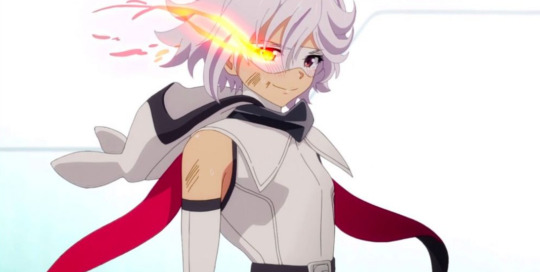
Premise: In a world where every country has a superhero, 14 year old Teru is Japan's. Her hero name is Shy, and that's exactly what she is-- she's a bit of shrinking violet at times and deals with social anxiety, which makes the public part of being a hero a struggle for her. But with a mysterious boy going around and turning people's hearts and pain against them to make them into dark, painful threats, she and the other heroes are going to have to step things up.
SHY is very much a magical girl show with am American-style-superhero coat of paint, and that's really what draws me to the series. Powers are based on your heart and emotions, the heroes friends and loved ones have their pain and despair manifest as terrible powers when induced by an outside force and then our heroes having to reach out to these people with love and compassion...it is so magical girl core. There's even a magical battle where mother and daughter must reach out to each other!
Also very distinctly magical girl-esque is how a lot of the series is focused on Teru and her cute girl bff having yuri undertones. Said friend calling out her name even activates Teru's "heart" and her powers truly awaken. IDK Teru that's pretty gay.
It does some things that are cool to see in a superhero show- like centering female characters and featuring a disabled superhero. This Anifem article also has an interesting take on one of the fights.
It's also not overly fanservicey so far either, though Teru mentions once that her leotard is skimpier than she's comfortable with (apparently magic assigns them their clothes) which sucks, (and it highlights her rear more than I'm comfortable at times considering her age). Let her have pants! But hey, after dealing with MHA's bullshit, I'll count my blessings that it's a regular leotard.
SHY is often a little silly-- the fact that apparently every country getting a superhero ended ALL WAR somehow is so ridic it wraps around to being endearing. It's also engages in some national stereotypes --for instance the Russian superhero who is Shy's mentor whole schtick being that she's always drunk (but you see it's okay because her alcoholism is based in her childhood love for her parent and she's fine and). There's a weird moment where an adult acts like she's going to kiss a teenager as a prank, and the pacing is a little uneven.
But when it hits, it really hits, and you really root for Teru. Seeing a superheroic take on struggling with social anxiety is fun, and Teru's passion and strength shines through. I'm excited to see more of her adventures, and fortunately a second season is confirmed!
Migi & Dali
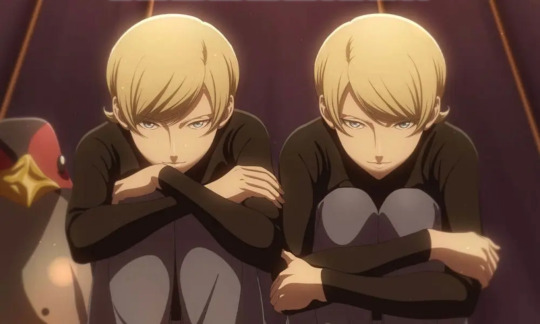
Premise: Orphaned twins Migi and Dali perform an amazing con to get adopted by a couple (who mention preferring to adopt only one child)-- they decide to pretend to be only one person, a boy named Hitori, with one of them always just out of sight as school or at home. They go to absurd levels to keep this up because they have an important goal-- their mother was murdered in this town, and they're going to do all they can to find her killer. But what mysteries does this suburban town hold?
It's hard to put Migi & Dali into words, but I'll do my best. It starts out as an utterly absurd show that plays it's "spookiness" so ridiculously that it becomes comedy (Mother's Basement compared it to the potato chip scene from Death Note, and I think that's apt, though it's very much intentional with this show). Seeing the ridiculous lengths the twins go to in order to keep up their con is amazing. Situations like them assuming their foster mother must be scalping children because they don't understand what a wig is or one twin throwing on a wig on so the other twin (who should know what he looks like because he can LOOK IN THE MIRROR) doesn't recognize him are hilarious.
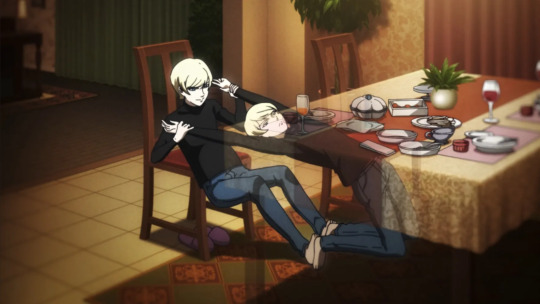
But then the show also becomes a tightly plotted and genuinely tense murder mystery that is incredibly moving at times? WHAT? All while keeping up it's signature brand of goofiness and absurdity! Side characters I did not expect to care about go through great development, Migi and Dali have some great character arcs, there's some genuine commentary on abuse, the damage you can do to children by forcing perfection on them, the struggle of being a foster kid, grief and recovery and more.
There are some things to warn for--parental abuse, rape through deception (def framed as bad, but yep. that happens), general harm to children, a very uncomfortable strip search of a child that involved ass-grabbing, and the weird bits where teen characters are kidnapped and forced to dress up and act like a baby (which turns out to be very thematically important and follows an interesting arc of being played partly for comedy at first then becoming deadly serious later) and of course the murder and stuff you'd expect from a murder mystery. (There's also some stuff involving infertility I think is fraught, but I can't really get into it without spoiling).
I know that's a huge list, but the show is definitely very rewarding--entertaining and full of more incredible twists and turns that one show has any right to be. Including the greatest housekeeper of all time, i would follow her into hell.
I can't get into more without spoiling, but yes, if you can handle this weird, wild ride, you should absolutely go on it. Sano Nami was a true talent.
#migi and dali#migi to dali#migi & dali#shy anime#shy teru#teru momijiyama#fall 2023 anime#my reviews#anime overview#anime
38 notes
·
View notes
Text
Master and Margarita (2024) review
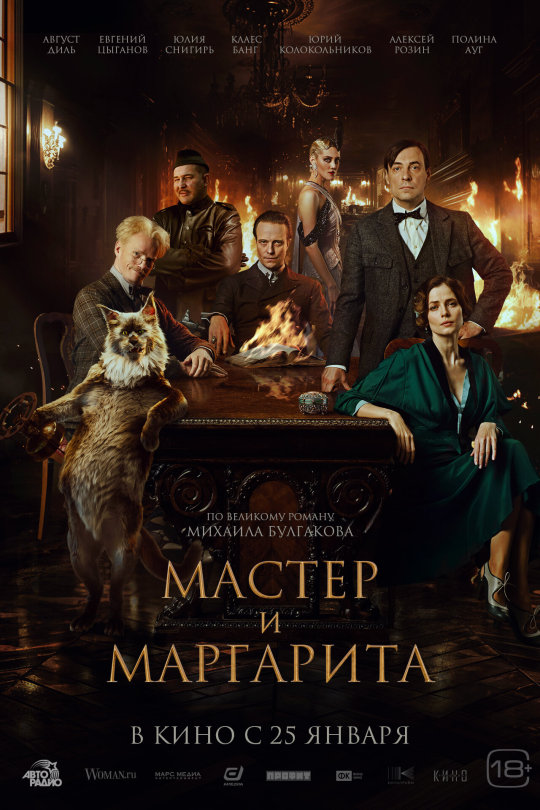
Oh when in Soviet Russia…
Plot: Based on Mikhail Bulgakov's novel "Master and Margarita". 1930's, Moscow. A famous writer is censored by the Soviet state: his novel is banned, and the theatrical premier of his new play about Pontius Pilate - canceled. In just a few days he becomes an outcast. Inspired by these misfortunes the writer conceives a new novel in which the devil, named Woland, satirically revenges all those responsible for the writer's downfall. He knows this novel can never be published in the USSR, but Margarita - his muse pushes him to write it no matter what.
I truly believe Master and Margarita is one of the most powerful pieces of literature to come out from Russia. Yes I am aware War & Peace is more talked about, but look, I read all of its 1000+ pages and though it is an epic in every sense of the word, it does drag quite about. As for Master and Margarita, Soviet writer Mikhail Bulgakov created a satirical, quasi-biblical allegory that represents themes that are crucial to the human experience, such as struggle between good and evil, corruption in government and high society, human fragility, religion and prophecy, and the endurance of love over all. It’s a masterfully written piece of work, and one that is truly hard to adapt to screen, due to how much happens through its pages. However I’m all for directors giving it a go, with Michael Lockshin taking the challenge with a motion picture that was originally a co-production between Russian studios and Universal Pictures, though the latter pulled out following the Russo-Ukrainian War, even though most of the filming was already complete. Nevertheless after multiple delays the final product is here, so let’s digest.
Let’s talk through the positives first. It’s nice to see a Russian production of such grand scale, that even gives Hollywood a run for its money. There are some truly spectacular set pieces, and also interesting visuals, especially of a futuristic post-modern take of the Soviet Union, that reminded me a little of the recent Atomic Heart video game. Also the inclusion of August Diehl who plays the central Satanic figure Voland. This casting choice was a truly inspired one, as Diehl both looks and feels as if he came out straight from the pages of Bulgakov’s novel. There’s just this presence to him, as you can tell the power behind his eyes, yet he can also be really charming and witty. Whenever he was on-screen, the movie fully came to life, as he managed to perfectly balance the damning mocking tone with a deep inner understanding of things beyond the human mind. Look, there’s a great reason why they casted an actor outside of Russia for this part, as Diehl honestly was incredible. Funny how this is the same guy who got his testicles shot off in that WW2 Tarantino flick. Evgeniy Tsyganov as the titular Master too felt perfectly apt for the role, in some ways personifying Mikhail Bulgakov himself. The Master is a character that can so easily come off as dull, as he’s generally very stoic and constantly deep in his own thoughts, so it was a nice interpretation with Tsyganov breathing more life into him.
Unfortunately this is where the positives end. Look, I think it is truly impressive for the entire novel to be transferred into a 2hr 30min film, and of course I expected certain parts to be rushed. However the movie shoots itself in the foot by trying to approach the source material in a different way. Messing with various realities and reorganising the events of the novel in a completely different order, the result is messy and all over the place. I can say with full certainty that if I haven’t read the book before that I’d be so confused as to what the hell was going on in this movie. From the way it jumps from one place to the other in non linear fashion made it so difficult to be engaged and feel connected with the characters. There was a lot of extra narrative elements added to an already overstuffed plot (with a lot of creative choices being outright baffling) as such causing the movie to need to rush even more certain other key plot points that again, it was really disorganised and jarring.
Also, I know that ever since Batman it’s now cool to go dark with everything, but The Master and Margarita is a novel that doesn’t shy away from raising a few eyebrows. In fact it goes out of its way to be as weird and ridiculous as possible, with the inherent horror and tragedy that befalls each of its characters being felt only later, after the laughs have died down. The humour in the book, especially the dark stuff - that’s sort of famously the Russian novelists’ coping mechanism against, uh, being a Russian novelist. Yet this new 2024 film hardly allows a single joke, and instead tries to cover everything with a dark dramatic tone, and I feel that really takes away from the charm of Master and Margarita. Heck there are even sequences in the film that are supposed to be played for laughs, like the Behemoth cat’s shootout with the KGB cops that screams for physical comedy potential, yet the movie kind of glosses over it in a very monotonous way.
Aside from August Diehl and Evgeniy Tsyganov, the casting left a lot to be desired. Yulia Snigir made for a really bland Margarita. Voland’s entourage of demons, who in the book are a cause for some truly entertaining if silly shenanigans, here are completely wasted, and in fact are borderline annoying. Yuri Kolokolnikov as Korovev, the main member of his entourage, was actually horrendous. In the source material Korovev is a trickster, yet there was still wiseness within his madness. Here however Kolokolnikov plays him as if he were some kind of deranged clown, screaming every single line and maniacally laughing for absolutely no reason. The talking cat, who is one of the book’s best characters, in here is just a CGI cat who says maybe only two lines of dialogue in the whole film, and even then it’s a lazy mumble courtesy of actor Yura Borisov. Claes Bang as Pontius Pilate looked bored out of his mind. To be fair, the whole biblical side plot of Pilot and Jesus suffers the most here by being downgraded to maybe 5 minutes, which at this rate I feel like they should have cut the whole thing out entirely as the 5 minutes added nothing to the overall film. But yes, Claes Bang was evidently there to collect a pay check, and part of me wishes that instead we just had James McAvoy reprise his comedic take of Pilate from The Book of Clarence that came out earlier in the year.
It was never going to be an easy feat adapting Bulgakov’s epic into a movie. The narrative lends itself so much better to a TV series format, and in fact there is a wonderful 2005 limited series adaptation from Vladimir Bortko, and now that right there is how you make Master and Margarita work! That series featured great music, amazing performances, and plenty of breathing room to give every nook and cranny detail of the book its proper time. 2024’s Master and Margarita doesn’t come anywhere close to it, and though I do admire Lockshin’s ambitions, in the end it all falls flat on its face. August Diehl however is truly phenomenal in this, and honestly I really need to watch more of his acting work. I hear A Hidden Life with him is supposed to be good. Adding that to my watchlist as we speak.
Overall score: 4/10
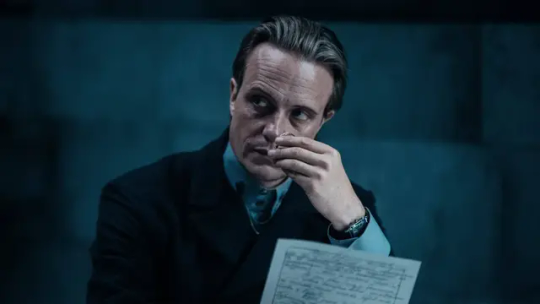
#master and margarita#movie#movie reviews#film#film reviews#cinema#fantasy#drama#master and margarita 2024#august diehl#claes bang#evgeniy tsyganov#yulia snigir#michael lock shin#Russia#mikhail bulgakov#master and margarita review#2024#2024 in film#2024 films#yuri kolokolnikov#voland#woland#romance#soviet union#soviet aesthetic
23 notes
·
View notes
Text
Nearest Neighbor Attacks: Russian APT Hack The Target By Exploiting Nearby Wi-Fi Networks
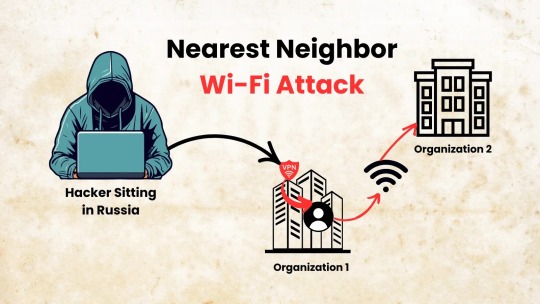
Source: https://gbhackers.com/nearest-neighbor-attacks/
More info: https://www.volexity.com/blog/2024/11/22/the-nearest-neighbor-attack-how-a-russian-apt-weaponized-nearby-wi-fi-networks-for-covert-access/
6 notes
·
View notes
Text
As Russian artillery rained down on the Ukrainian city of Kherson last year, one girl found a surprising way of processing the horror that was taking place. She passed the time in a bomb shelter playing the stark, many would say depressing, video game This War of Mine.
There is a critical burden for every Ukrainian this winter. For her, it is trying to make sense of a terrible conflict. For Ukrainian President Volodymyr Zelenskyy, it is getting the weapons and international support to fight Russia and keep strategic momentum on his country’s side. For his soldiers, it is trying to keep morale up and stay warm in freezing temperatures. And for the almost 8 million Ukrainian refugees that the war has created, it is trying to rebuild lives in foreign countries.
A disproportionate number are doing so in Poland, which has registered more than 1.4 million of them for temporary protection, the largest number of any EU country, according to ReliefWeb.
The country’s particularly strong solidarity is replicated across Eastern Europe. Warsaw resident Konrad Adamczewski puts it down to proximity: “This was a war that broke out in a neighbouring country. You could immediately see people coming to Poland for shelter.”
The company he works for, 11 bit studios, made the bestselling This War of Mine. The unnamed Ukrainian girl in the basement got in contact at some point last year to thank them for the help the game gave her.
11 bit studios has been showing its solidarity since the beginning of the war in other ways, too. Within hours of Russia’s campaign, the company launched a fundraiser. For a week, all proceeds from sales of This War of Mine would be donated to the Ukrainian Red Cross. Some $850,000 was raised, far exceeding what the company had expected. “The impact was huge. We were very happy we could contribute, but it was also hugely sad that in 2022 the message of the game was once again so vivid,” Mr Adamczewski told me.
It was a remarkable achievement financially. But, as Mr Adamczewski went on to say, it is only when you look at the content of the game itself that you realise quite how apt the campaign was on deeper levels. “We developed this as a game about peace. Immediately we saw people commenting online that the scenes of innocent people suffering unfolding on the news looked like This War of Mine.”
The game is, after all, entirely about war, but barely about soldiers. Instead, civilians are the protagonists in an unnamed conflict, as they try to survive and not lose hope in the process. Winning, if it can even be called that, is not triumph in battle, but just to survive until the end of the siege.
The setting is loosely based of the siege of Sarajevo, one of the longest in modern history, in which non-combatants were often forced into otherwise immoral acts to survive, be it hoarding resources, theft or even violence. But if the game had been released in 2022, Mariupol, Bakhmut or Kherson could well have been the inspiration.
Now the game is helping children outside Ukraine as well. At the end of 2022, it was officially included in Poland’s curriculum. Teacher Ilona Starosta says she uses it in her classes because of its many perspectives. “Students wonder what it means to win a game like this. Does winning mean surviving? Does it make sense to survive at all costs?”
These questions are not delivered in abstract debates. Players might be in the shoes of Adam, who struggles to get medicine for his ill child as he tries to untangle his own mind from severe shell shock. Or they might be journalist Malik, who has to balance the need to broadcast life-saving information with not angering a censorious military.
For Mr Adamczewski, the potential for explaining these dilemmas makes gaming a uniquely powerful tool for learning: “When children study literature, there is often a question of what the author had in mind. But in games, you become the author.”
The depth of the game has caught global attention. In the UK, London’s Imperial War Museum features it as an installation in its War Games exhibition, which opened in September. Curators placed it next to artefacts that captives made during the Second World War to create a sense of normality during extreme hardship; they include a teapot, given to an English prisoner of war by a Polish comrade, and improvised cigarettes. In the US, the game is featured in New York’s Museum of Modern Art’s exhibition Video Games and Other Interactive Design, which also opened in September.
However much renewed attention the game is getting globally, it remains a success firmly rooted in Poland. Like many other places in Eastern Europe, the country has a remarkably creative independent gaming sector.
As a developer, Mr Adamczewski says that the arrival of personal computers in the 1980s was a radical opportunity to learn more about life outside the communist bloc. More simply, people also wanted to use them to play games. With no access to ones developed in the West, people started developing their own. This wider wave of tech curiosity and the chance to start afresh after the fall of the Soviet Union are reasons that Eastern Europe has much better internet connectivity than richer western European countries.
But more than just a leading economic asset, the region’s gaming sector is becoming a cultural one, too. In the case of This War of Mine, to remind people that war has a terrible, complex impact on civilians. It is far too soon to say if a video game will ever reach the renown of All Quiet on the Western Front or Dulce et Decorum Est, classics that will explain history's worst moments for generations. But if one ever does, it could well come from Eastern Europe.
17 notes
·
View notes
Text
12th of February 2025, SONG OF THE DAY:
Bolshy
youtube
Released in 2013 on the album 'Electric'
Produced by Stuart Price, the album 'Electric' was created with the intention of being a dance album (at least partially motivated by a fan comment, saying PSB should be “more banging and lasers”)
As the second track on the album, Bolshy is an interesting play on the antithetical ideas that love can often (unhealthily?) manifest as wanting to 'own' someone, yet a significant 'bolshy' (ie. Bolshevist) principle is that private property should be abolished.
“I don't believe you don't know you can own me.”
(Although, in view of this line and considering Neil's long-standing interest in Russian history, perhaps it's hinting that, in practice, the ideas aren't as mutually exclusive as they should be. Consciously or not, it's an apt analogy for the often hypocritical and undemocratic nature of Bolshevism.)
Whatever the deeper meaning, the chorus is extremely catchy and hypnotic. Bolshy bolshy bolshy oh....
2 notes
·
View notes